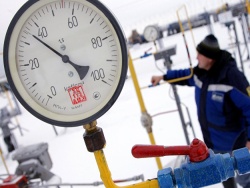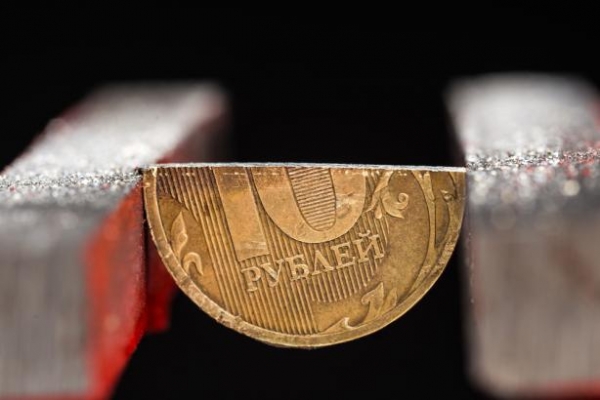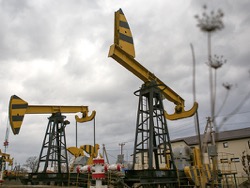
According to OPEC forecasts until 2040 (World Oil Outlook) average price of oil will rise by an average of 5 dollars a year until 2021 when it reaches in nominal terms, $ 65 per barrel.
By 2040, the average price of oil basket of OPEC countries, according to the forecast, could reach $ 155 (or $ 92 in 2015 prices). In the short and medium term prices will primarily be driven by the expected balance of supply and demand — what is better measured by the stock change in the world. Prices will also be influenced by factors such as geopolitics and speculative activity in the market and the mood of the bidders, representatives of the OPEC.
However, a published analysis of the Institute “development Center” Higher school of Economics, from which it follows that the commodity dependence of the Russian economy during the years of crisis have only increased. On average, the commodity sector for the crisis, rose 4 percent, non-oil — fell by 9.3 percent. Manufacturing dipped by 7.2 percent, construction for 12.8 percent, paid services — by 2.4 percent, and so on.
In recent months, raw roll is intensified, it is stated in the latest Bulletin “Comments on government and business”. So, in the third quarter, agriculture grew by 1.8 percent (an increase from the previous quarter, seasonally adjusted), extraction of minerals without the contribution of oil services — 1.1 percent, freight turnover — by 3.6 percent.
How justified are these assumptions?
— Depends on what is meant by addiction, says a leading expert of the national energy security Fund Igor Yushkov.
If we view the Federal budget revenues, we see that the percentage of revenues from the oil and gas industry has decreased. Before the sale of energy gave some 51% of Russian budget revenues. Now the share of oil and gas revenues slid to forty percent. Of course, this does not happen from what began to give greater revenue other sectors of the economy. The reason is simple and trivial — the fall in oil prices and a proportional decrease in tax revenues (severance tax and export duties) to the state budget from oil companies.
The crisis of the manufacturing industry in Russia is also associated with the drop in oil prices. Before oil and gas company actively developed a variety of projects that have been engines of development for the related industries — engineering, chemical industry. Yes, and in the West, bought a lot of equipment, but there is a drilling platform for gas production in the Arctic were built “Uralmash”. Naturally, the reduction in the number of such projects impact on the Russian economy as a whole, because many industries in Russia is related to oil and gas.
In addition, no matter how we invigorated what sanctions we can transcend certain negative effect continues to reverberate. Foreign investors are reluctant to invest not only in oil and gas industry, fell under the sanctions, but also in other sectors of the economy money is extremely small. Although the list of entities prohibited to give loans to EU countries and USA, not so great, but others, not caught in a “hit list” of companies often are unable to rely on loans from the West. And the Chinese, for example, give loans, but mostly at very high interest rates. Not by chance the head of LUKOIL Vagit Alekperov found them the most expensive in the world. Able to get them at affordable rates only those companies in which the Chinese themselves are interested. The same LNG plant in Yamal will supply gas to China, so there are investments from China. Soon, perhaps, they will give credit for the construction of the Amur gas processing plant. Because the products of these companies will go to China.
In General we can say that neither China nor India, which we expected, when sanctions were imposed, not in a hurry to help the Russian economy. Rather, try to derive maximum benefit from our problems, to profit.
“SP”: — That is, in non-oil sectors of the economy except agricultural, all rather sad?
— The trends are very different. Look at the military-industrial complex, the sanctions stimulated development of some industries. Is the development of a private helicopter engines, turbine engines for ships and so on. Nowhere to go, have to adapt, to evolve.
“SP”: — If to believe the forecast OPEC, Russia, especially, don’t fret over a couple of decades can be relatively easily “sit” on oil and gas pipe?
— You have to understand that OPEC is making these predictions based on their own interests. This organization very much do not want to reduce its influence in the world. Previously, it was assumed that OPEC, which controls much of the world’s oil reserves can have serious effects on the world economy as a whole. However, recent years with the fall in energy prices are increasingly talking about the fact that the era of oil is ending, time to move on to other energy sources, etc. Their forecast is more designed for media effect, is an attempt once again to prove to everyone how important oil is to the global economy.
And in this forecast is the logic. In response to falling energy prices, investments in new projects for their production is minimal. This means that in 7-10 years the deficit in the oil and gas market will begin to seriously worsen. As old fields are depleted, and the development of new it will take time. This problem is typical for Russia. Now we set the historical record of energy production, but the last two years investments in new fields are simply not there. And production in the West Siberian fields is declining. Albeit not much, under 1 percent a year, but gradually decrease may become noticeable. Naturally, the less will be produced of oil in the world, the more expensive it will become.
By the way, in the period of cheap energy, they are actively purchasing. Not coincidentally Gazprom now puts the record on gas supplies to Europe. Europeans at one time actively refused gas because of its high cost, even over to coal. Now happy to purchase “blue fuel” in raised volumes. Gradually, the demand for energy will increase in those countries where it still was low. The most illustrative example is India. This is not the richest country in the era of cheap energy is very handy. It will increase their purchase.
With regard to commodity dependence, to us, to reduce, of course, necessary. But it is important not to fall into extremes. Sometimes it is still possible to hear statements that this is the almost oil production prevents us to develop high technology. But in this sense, the example of Norway. They have all the high-tech sector serving the oil and gas industry. We also could use would make oil and gas complex of the fifth innovative cluster. We have achievements in this field. The same fracturing, which allowed US to implement the “shale revolution” was first used in the USSR. We have recently built the first plant for the production of plastic Windows. This is despite the fact that we are one of the leading oil producing countries. Prospects for development we have. At low prices of raw materials more profitable to do of it products. And now, you can export it at higher prices.








